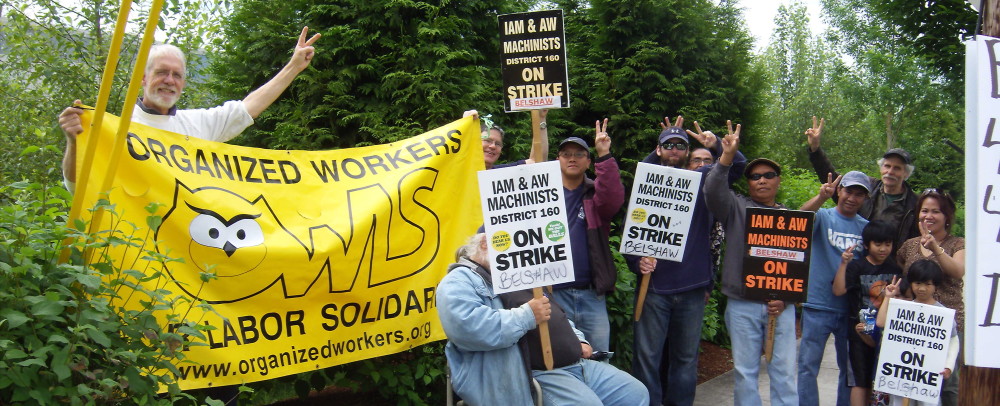Below is a report given at the October OWLS Meeting by ATU 587 member and shop steward Adam Arriaga. It offers invaluable information for workers on some of the rights and protections they have under the ongoing Covid pandemic.
On Feb. 29, 2020, Gov Jay Inslee issues a State of Emergency because the first case of COVID-19 in the US was here in WA. On May 11, 2021, Gov Inslee signed into law Engrossed Substitute Senate Bill(s) 5115 and 5190. Both bills were effective immediately and supersedes or replaces most of the original State of Emergency declaration having to do with workers comp benefits.
What is ESSB 5115? (AKA Health Emergency Labor Standards Act)
- Amends state law and adds sections in regard to workers comp benefits during a public health emergency
- Defines what frontline workers are.
- Establishes that COVID-19 is an occupational disease during a public health emergency.
- Establishes presumptive coverage for workers who contract COVID. That means if a frontline worker contracts covid, it is presumed the worker caught it on the job. A “preponderance of evidence” is needed to prove the frontline worker did not catch it at work.
What is ESSB 5190?
- Amends several state laws to provide better protection and L&I benefits specific to health care workers during a public health emergency
- Defines health care workers and health care facilities
- Presumptive coverage using slightly different definition of contagious disease from 5115 during a public health emergency.
- The presumption may be rebutted with “clear and convincing evidence” as opposed to “a preponderance of evidence”
- Public health emergency declared by POTUS or Gov of WA
Who are frontline workers?
- First responders
- Hospital, health care facility, nursing home, and assisted living facility workers
- Workers performing food processing, manufacturing, distribution, or meat packing
- Farmworkers
- Maintenance, janitorial, and food service workers at any facility treating patients
- Public transit drivers and operators
- Employees of licensed child care facilities
- Employees of retail stores, which remain open to the public during the emergency
- Employees of hotels, motels, or other transient accommodation
- Restaurant employees who have contact with the public or co-workers
- Certified home care aides who work primarily in the home of individuals receiving care
- Corrections officers and support employees working at a correctional institution
- Certain school district and higher education employees
- Public library employees
Claims and Coverage for COVID-19
- Once a claim is allowed, workers are eligible for medical and disability benefits
- The insurer (L&I or a self-insured business) will pay for treatment of COVID-19.
- Appropriate, medically required testing/surveillance would also be covered. This is a time-limited benefit, and no benefits would be paid after the worker tests negative for COVID-19 or the quarantine period has ended, unless the worker develops the disease.
Scenarios where a frontline worker’s claim can be accepted (not all inclusive but those below are verified)
- Positive test for covid
- Quarantined by a health professional or health department due to an exposure or having symptoms. Time loss will be paid even if the worker tests negative when the quarantine ends.
- Being sent home by your employer because of symptoms or an exposure (not 100% verified)
- Adverse reactions to the vaccine when its required to be fully vaccinated by the employer
Non-frontline workers
Claims that meet certain criteria for exposure will be considered on a case-by-case basis.
When to file a claim
When work-related activity has resulted in probable exposure to the virus and certain criteria are met. In these cases, the worker’s occupation must have a greater likelihood of contracting the disease because of the job. There must also be a documented or probable work-related exposure, and an employee/employer relationship.
Questions for the provider treating the non-frontline worker
- Was there an increased risk or greater likelihood of contracting the condition due to the worker’s occupation (such as a first responder or health care worker)?
- If not for their job, would the worker have been exposed to the virus or contracted the condition?
- Can the worker identify a specific source or event during the performance of his or her employment that resulted in exposure to the new coronavirus (examples include a first responder or health care worker who has actually treated a patient with the virus)?
- If the above criteria are not met, it is not necessary to file a workers’ compensation claim; however, a claim may still be filed if requested by the worker or if the provider is uncertain if the case meets the criteria.
When will a claim likely be denied?
When the contraction of COVID-19 is incidental to the workplace or common to all employment (such as an office worker who contracts the condition from a fellow worker), a claim for exposure to and contraction of the disease will be denied.
*The above is a summary based on info available from WA State L&I website as of 10/26/2021. For the most accurate info, check out the links below.
Common Questions About Presumptive Coverage for Health Care and Frontline Workers
Self-Insurance and Coronavirus (COVID-19) Common Questions
Workers’ Compensation Coverage and Coronavirus (COVID-19) Common Questions
